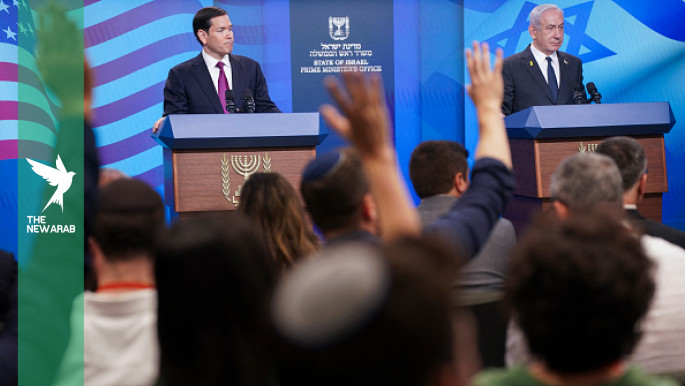Rubio’s joint press conference with Prime Minister Benjamin Netanyahu in Jerusalem on Monday offered no daylight between the two leaders [Getty]
US Secretary of State Marco Rubio‘s visit to Israel this week showcased not only Washington’s unwavering support for Israel’s war on Gaza but also the extent to which American political figures are aligning with some of Israel’s most controversial policies.
On the same day, Tuesday, that UN investigators released a damning 72-page report concluding that Israel had carried out four of the five genocidal acts defined by the 1948 Genocide Convention, Netanyahu’s government welcomed the largest-ever American political delegation to Israel as part of the “50 States One Israel” annual event.
The visit highlighted the shocking closeness between the Trump administration and the most right-wing government in Israel’s history, which stands accused of war crime and genocide and even striking one of Washington’s strongest regional allies.
Standing with Netanyahu on Gaza and Qatar
Rubio’s joint press conference with Prime Minister Benjamin Netanyahu in Jerusalem on Monday offered no daylight between the two leaders.
Netanyahu defended Israel’s airstrike on Doha, which targeted senior Hamas figures meeting to discuss a Gaza ceasefire but instead killed five lower-ranking members, taking “full responsibility” despite international outrage.
Rubio refused to criticise the attack, declaring instead that Hamas “must cease to exist as an armed element that can threaten peace and security in the region”.
Pressed on Gaza, where famine deaths are mounting daily and mass expulsions accompany Israel’s ground offensive on Gaza City, Rubio sidestepped by saying: “We are focused on what happens next”.
His remarks came as the UN Human Rights Council convened an urgent debate on Israel’s assault on Qatar and as UN officials warned that Gaza’s hospitals were overflowing with starving children and amputees.
Gaza’s health ministry reported four fetuses and three premature babies had died in Khan Younis due to lack of food and medicine, bringing the famine death toll to at least 422, including 145 children.
By standing alongside Netanyahu, Rubio signalled Washington’s unwavering commitment even at the cost of alienating Qatar, one of the few remaining mediators and a major non-NATO ally.
Netanyahu vowed to continue striking “wherever Hamas exists”, while Rubio’s focus on “the future” effectively shielded Israel from accountability for an act the UN and Arab states denounced as reckless and unlawful state terror.
Rubio also warned that the intended recognition of Palestine by several US allies, including the UK, France, Canada, Belgium and Australia, would make peace “less likely”.
Inaugurating settlement-linked archaeological project
During his visit to Israel on Monday, Rubio attended the inauguration of the so-called “Pilgrimage Road” excavation in East Jerusalem, a settler-run project long condemned by Palestinians and international bodies.
The site, operated by the hardline settler organisation Elad, runs beneath Palestinian homes in Silwan, a neighbourhood facing evictions, home demolitions, and what the UN has described as systematic displacement.
Israeli authorities market the tunnel as an ancient Jewish route to the Second Temple, but Palestinian and independent experts argue that the project rests on selective and politicised readings of archaeology, designed to impose a biblical narrative while erasing the city’s historical Palestinian identity.
Former Al-Aqsa media official Abdullah Marouf has previously told The New Arab that the route, historically known as the ‘Cheesemakers Street’ (Al-Jabbaneen), has been cynically repackaged as a tunnel to bolster claims of an exclusive Jewish link to Jerusalem.
UNESCO and the UN Security Council have both declared such excavations illegal under international law, since East Jerusalem remains occupied territory under Resolution 242.
Yet Rubio brushed aside those rulings, posting on X that the site was “a powerful reminder of the Judeo-Christian values that inspired America’s Founding Fathers”.
’50 States, One Israel’
Rubio’s visit coincided with the controversial “50 States One Israel” annual event, which brought more than 250 American legislators to Israel, the largest such delegation in history.
The trip, from 14 to 18 September, is fully funded and organised by Israel’s foreign ministry and includes meetings with Netanyahu, Herzog, Foreign Minister Gideon Sa’ar, and Knesset Speaker Amir Ohana.
The itinerary featured visits to the Western Wall, the Church of the Holy Sepulchre, and the Yad Vashem Holocaust memorial in occupied Jerusalem, as well as trips to Israeli communities allegedly affected by the 7 October 2023 events.
Delegates also planted 50 trees in Park Ofakim to symbolise “unity” with Israel in a gesture rooted in Zionist narratives where tree planting has often been used as a tool of political control over Palestinian land.
Israeli officials used the event to press lawmakers to advance anti-BDS legislation in their home states, urging them to combat what Israel calls “global delegitimisation efforts”.
At the opening ceremony, lawmakers were serenaded with ‘Somewhere Over the Rainbow’ in a surreal moment that US activists described as political theatre aimed at softening the spectacle of US loyalty to a government accused of genocide.


